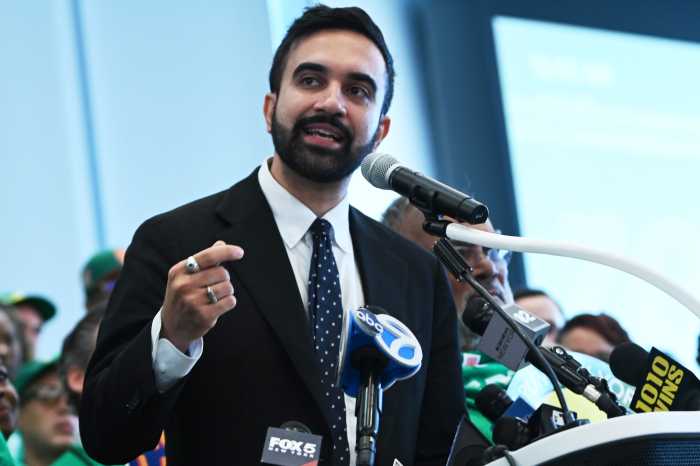Katelynn Rodriguez and Roy Abramsohn in Randy Moore’s “Escape from Tomorrow.” | PRODUCERS DISTRIBUTION AGENCY
It’s hard to explain how a film as consistently entertaining as “Escape From Tomorrow” could wind up so unsatisfying in the end. One answer is that its prankish sensibility works best in short, sharp jabs –– it accomplishes nothing in 90 minutes that the Fall’s 1984 song “Disney’s Dream Debased” couldn’t do in five.
The tale of one man’s mental and physical breakdown at a Disney theme park, the film created quite a bit of controversy at its Sundance premiere earlier this year. Given its potential for running afoul of trademark and copyright law –– although the word “Disney” is only heard once, partially edited out –– many speculated it could never legally be released. However, the Disney team obviously realized they’d look like censors if they tried to bar its release, while giving the film lots of free publicity. It makes sense that its distributor, the Producers Distribution Agency, is best known for the pseudonymous street artist Banksy’s documentary “Exit Through the Gift Shop” –– the two films share a punk irreverence, although Banksy’s is better thought out.
Randy Moore’s Disney dystopia has its comic irony, but struggles to deliver more
At the beginning of “Escape From Tomorrow,” Jim (Roy Abramsohn) has just arrived with his wife, Emily (Elena Schuber), and their son, Elliot, and daughter, Sarah, for a vacation at Disney World and Epcot. Stepping onto his hotel balcony to take a phone call, he learns he’s just been fired. Keeping the news a secret from his family, he heads to the theme park with them. At first, he has a good time with them, but two teenage French girls catch his libidinous eye. His fun day at the park soon turns into something more akin to a bad acid trip. He’s going insane, being experimented on by a mad scientist, and/ or physically ill.
“Escape From Tomorrow” was shot on black and white video, mostly at the park itself. Director Randy Moore did not go the easy route of making it look like a home movie. Somehow, the use of black and white makes the film’s integration of modest special effects –– like the pupils of Elliot’s eyes turning completely black and the explosion of the Epcot dome –– all the more believable. The film feels up to date, with Jim and Emily communicating via cell phone at the park, yet also faintly retro, like the Disney ethos itself.
All the film’s female characters over 12 come across either as annoyances (Emily) or temptresses (the French girls and the woman with whom Jim has a brief, kinky fling). To some extent, this is justified because “Escape From Tomorrow” presents the world through a first-person perspective, depicting life through Jim’s eyes. He’s a horny man suffering from a traumatic mid-life crisis, so it’s natural that his perceptions reflect this. However, the film never suggests any alternative perspective. Emily’s nagging seems designed to justify Jim’s infidelity.
“Escape From Tomorrow” assumes that Disney is a malign force in our culture and that its audience will agree. I don’t exactly dispute Moore’s perspective, but I’m not sure he’s coming at it from the right angle. I don’t think the Disney mythology is targeted at men in their 40s suffering from job loss and marital frustrations. Adults can certainly see some irony in the notion of a Disney theme park as “the happiest place on Earth” and still go on to have a good time there. If Disney princesses have a negative effect on anyone, it's on young girls who grow up wanting to become them when they could instead dream of being scientists, teachers, or politicians. “Escape From Tomorrow” ignores this in favor of portraying an urban legend about rich Asian businessmen paying thousands of dollars to sleep with the women who portray princesses in the park. Compared to Jim, his kids mostly take Disneyworld and Epcot in stride.
Rather than in-depth satire on Disney and its effects on American culture, “Escape From Tomorrow” offers a series of potshots. Many of them land –– the film is funny throughout, and Abramsohn’s sad-sack performance keeps it engaging. Yet there’s something smug about it in the end, as Moore assumes the audience is safe from getting seduced by Disney. He’s talked about how the film originated in the feeling his childhood was warped by Disney. That perspective is missing from the final film, replaced by lots of gratuitous weirdness.
ESCAPE FROM TOMORROW | Directed by Randy Moore | Producers Distribution Agency | Opens Oct. 11 | IFC Center, 323 Sixth Ave. at W. Third St. | ifccenter.com



































